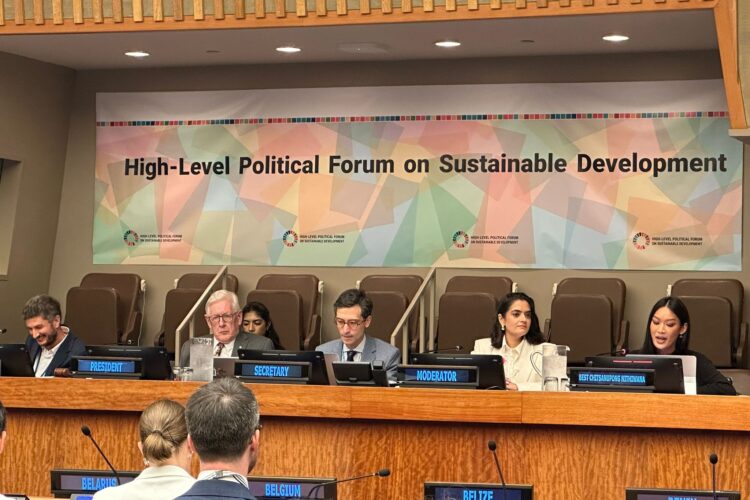17 July 2025, High-level Political Forum on Sustainable Development, New York
Multilateralism is a principle of international cooperation where multiple countries work together to address global challenges and achieve common goals. That is what achieving the sustainable development goals are all about. Multilateralism continues to fail to reflect the lived realities of trans and gender diverse communities, as well as to reflect the community leadership in meeting those goals.
For the first time, GATE was present on an official session at the High-level Political Forum on Sustainable Development. It was an honour to speak alongside Bob Rae, President of ECOSOC, Winnie Byanyima, Executive Director of UNAIDS, and Nyaradzayi Gumbonzvanda, Deputy Executive Director of UN Women. Beside that, the leading discussion featured two queer activists from Asia-Pacific, showing a sign of inclusion and representation.
Our Human Rights Officer, Best Chitsanupong, delivered a statement at the High-level Political Forum on Sustainable Development session “Delivering the 2030 Agenda: Aligning Global Processes Through Inclusive Multilateralism” highlighting how multilateralism is failing on trans and gender diverse communities and how that is impacting the achievement of the SDG’s worldwide.
The session organized by Major Group & Other Stakeholders (MGoS) centered the role of civil society and other stakeholders in defending human rights, countering the growing backlash against inclusive development, and driving practical action—especially around SDG 5 (Gender Equality) SDG 3 (Good Health and Wellbeing) and SDG 8 (Decent Work and Economic Growth), on July 17.
Why is multilateralism failing trans communities?
- Lack of representation: structurally excluded communities such as trans, gender diverse, intersex, sex workers and other key populations, are not meaningfully included in global decision-making spaces.
- Youth exclusion from power: only 2.8% of global parliamentarians are under 30, while the world’s youth population is over 1.2 billion, showing a major disconnect between who is affected and who decides.
- Tokenism over true engagement: existing structures prioritize symbolic inclusion instead of genuine participation, failing to reflect real lived experiences and leadership from our communities.
- Cuts to critical funding: defunding LGBTI and grassroots movements it’s a political act of exclusion, silencing the same communities that multilateralism claims to represent.
- Failure to respond to crisis with inclusion: in times of global crisis, multilateral systems often pull back from engagement with the most marginalized groups instead of standing firm or increasing their support.
- Persistence of structural inequality: Multilateralism is built on systems created by older generations, which continue to ignore or exclude the realities of today’s diverse youth and marginalized populations.
- Disconnection between data and dignity: systems tend to prioritize numbers over human lives, and policies often fail to center dignity, intersectionality, or grassroots knowledge.
- Resistance to reform: despite urgent calls, the system remains slow to change, failing to implement reforms that would allow truly inclusive participation and leadership, especially from trans and gender diverse experts, leaders and communities.
Watch the full speech:






